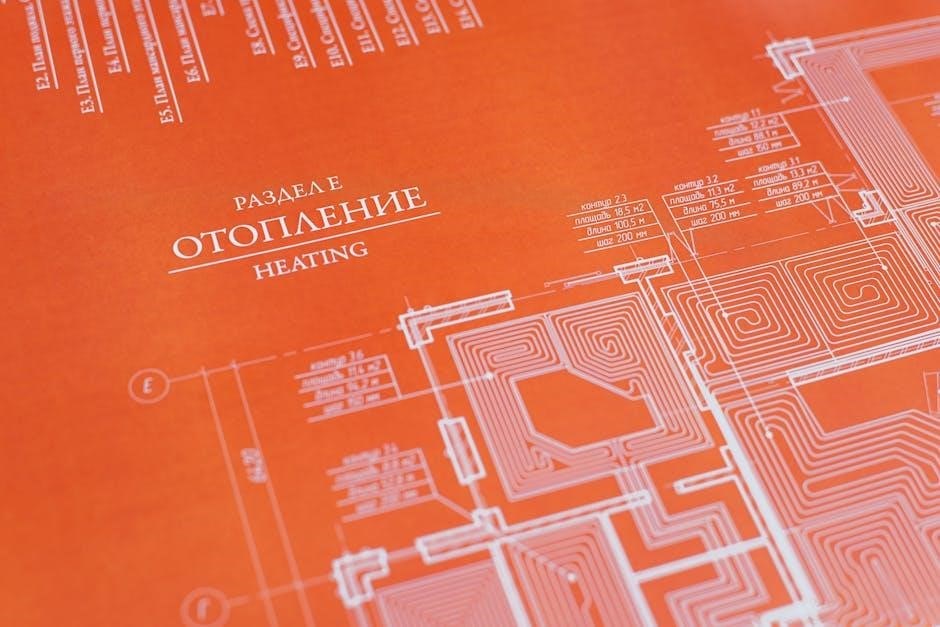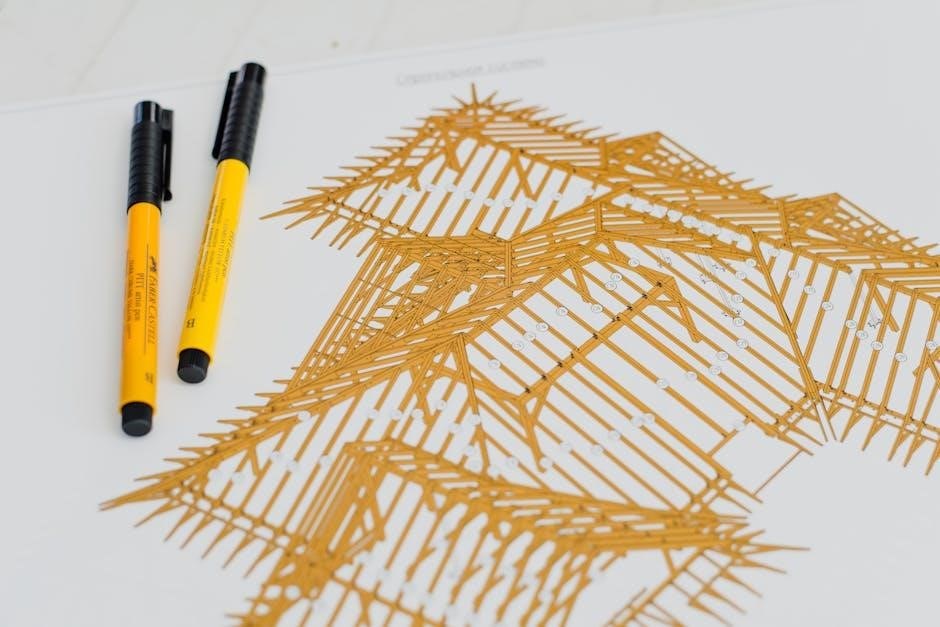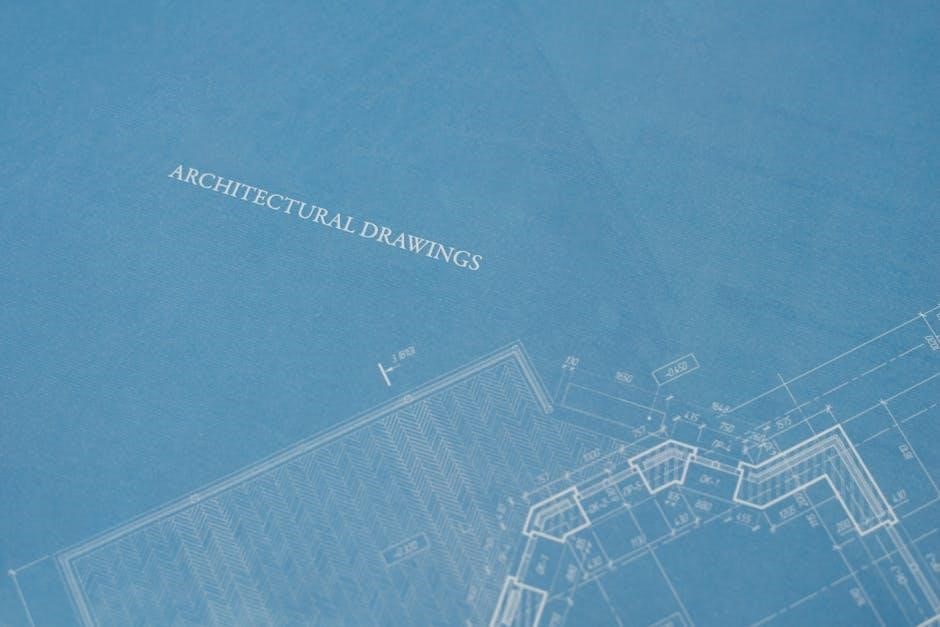The Advanced Diploma of Civil Construction Design is a specialized qualification for professionals seeking advanced skills in civil engineering and construction design.

Overview of the Advanced Diploma of Civil Construction Design
The Advanced Diploma of Civil Construction Design is a nationally recognized qualification in Australia‚ designed for individuals seeking to enhance their expertise in civil engineering and construction design. This program focuses on developing advanced skills in planning‚ designing‚ and managing complex civil infrastructure projects. It requires the completion of 12 units of competency‚ including 5 core and 7 specialty units. The qualification prepares learners for roles such as Civil Engineering Draftsperson‚ Senior Civil Works Designer‚ or Para-Professional Designer. It emphasizes the development of strategic planning‚ technical design‚ and project management capabilities. Additionally‚ students must demonstrate well-developed language‚ literacy‚ and numeracy (LLN) skills to meet the demands of the role. This qualification is ideal for those aiming to support engineers in delivering intricate and large-scale civil construction projects.
Target Audience for the Advanced Diploma of Civil Construction Design
The Advanced Diploma of Civil Construction Design is tailored for professionals seeking to advance their careers in civil engineering and construction. It is ideal for individuals working as draftspersons‚ designers‚ or para-professionals in the construction industry. This qualification is particularly suitable for those aiming to transition into senior roles‚ such as Senior Civil Works Designers or Para-Professional Designers. Additionally‚ it appeals to individuals who wish to enhance their technical and strategic planning skills to manage complex projects. The program is also beneficial for those looking to meet the specific skill assessment requirements for roles requiring advanced competencies in civil construction design. By targeting these professionals‚ the diploma ensures they are equipped to meet industry demands and contribute effectively to engineering projects.
Benefits of Pursuing the Advanced Diploma of Civil Construction Design
Pursuing the Advanced Diploma of Civil Construction Design offers numerous career-enhancing benefits. It equips professionals with advanced technical and strategic planning skills‚ enabling them to manage complex civil construction projects effectively. The qualification enhances employability by demonstrating expertise in design and drafting‚ aligning with industry demands. Additionally‚ it provides opportunities for career advancement‚ such as transitioning into senior roles like Senior Civil Works Designer or Para-Professional Designer. The diploma also ensures compliance with skill assessment requirements‚ making graduates highly competitive in the job market. By gaining specialized knowledge and practical competencies‚ individuals can contribute more effectively to engineering projects and advance their professional development in the civil construction sector.

Course Structure and Units
The Advanced Diploma requires completing 12 units of competency‚ including 5 core and 7 specialty units‚ though not all specialty units are available at every location.
Total Units of Competency Required
The Advanced Diploma of Civil Construction Design requires completing a total of 12 units of competency. These include 5 core units and 7 specialty units. The core units are mandatory and provide foundational knowledge and skills essential for the role‚ such as project management‚ risk assessment‚ and design principles. The specialty units allow learners to specialize in specific areas of civil construction design‚ such as infrastructure design‚ geotechnical engineering‚ or structural analysis. Not all specialty units are offered at every training location‚ so it’s important to check availability. These units ensure learners gain comprehensive skills to manage complex projects and design intricate systems‚ preparing them for roles like senior civil works designers or para-professional designers supporting engineers.

Core Units of Competency
The Advanced Diploma of Civil Construction Design includes 5 core units of competency that are essential for building foundational skills. These units cover critical areas such as managing civil construction projects‚ conducting risk assessments‚ applying design principles‚ and using CAD software for drafting and design. Learners also gain knowledge of construction codes‚ standards‚ and legislative requirements. These core units ensure a solid understanding of the technical and managerial aspects of civil construction design. They are mandatory for all students and must be completed before progressing to specialty or elective units. The core units provide the necessary skills to interpret design specifications‚ analyze data‚ and apply engineering principles to real-world problems. They form the backbone of the qualification‚ enabling learners to tackle complex design challenges effectively.
Specialty Units of Competency
The Advanced Diploma of Civil Construction Design includes specialty units that allow learners to focus on specific areas of expertise. These units cover advanced topics such as designing road structures‚ drainage systems‚ and structural analysis. Learners also develop skills in geotechnical engineering‚ hydraulics‚ and project management. Specialty units enable students to tailor their learning to career goals‚ such as becoming a civil works designer or a structural engineer. These units emphasize practical application‚ ensuring learners can design complex systems and solutions. They build on core competencies‚ providing deeper technical knowledge and problem-solving skills. Completing specialty units prepares learners for advanced roles in civil construction‚ equipping them with specialized expertise to tackle industry challenges effectively.
Elective Units and Their Importance
Elective units in the Advanced Diploma of Civil Construction Design allow learners to customize their education by selecting specialized areas of study. These units complement core competencies by providing deeper knowledge in specific domains like sustainable design‚ advanced structural analysis‚ or project coordination. Electives enable students to align their learning with career aspirations‚ enhancing their expertise in niche areas. They also foster adaptability and innovation‚ preparing graduates for diverse industry demands. The flexibility of elective choices ensures a well-rounded skill set‚ making learners more competitive in the job market. Additionally‚ electives often address emerging trends‚ ensuring graduates are equipped with cutting-edge knowledge and practices in civil construction design.

Skill Assessment Requirements
The Advanced Diploma requires assessments of language‚ literacy‚ numeracy‚ and technical skills. Practical tasks‚ projects‚ and exams evaluate design‚ problem-solving‚ and software proficiency.
Language‚ Literacy‚ and Numeracy (LLN) Skills
Proficiency in Language‚ Literacy‚ and Numeracy (LLN) skills is essential for the Advanced Diploma of Civil Construction Design. Students must demonstrate clear communication‚ comprehension‚ and mathematical abilities. Assessments include reading complex technical documents‚ interpreting design plans‚ and performing calculations accurately. Literacy skills are evaluated through written reports and technical documentation‚ while numeracy is tested through problem-solving tasks and data analysis. These skills are critical for interpreting project specifications‚ preparing detailed designs‚ and ensuring compliance with safety standards. Students with inadequate LLN skills may require additional support or bridging courses to meet the program’s demands. Strong LLN proficiency ensures students can effectively engage with coursework and apply their knowledge in real-world scenarios.
Practical Skills and Competencies
Practical skills and competencies are critical for success in the Advanced Diploma of Civil Construction Design. Students must demonstrate proficiency in using CAD software‚ interpreting technical drawings‚ and applying civil construction standards. Practical tasks involve designing infrastructure projects‚ conducting site surveys‚ and analyzing materials. Competencies include preparing detailed designs‚ ensuring compliance with safety protocols‚ and troubleshooting technical issues. Hands-on experience is gained through simulated work environments and real-world projects. Assessments may involve creating 2D and 3D models‚ developing construction plans‚ and presenting design solutions. These practical skills ensure graduates can apply theoretical knowledge effectively in professional settings‚ making them job-ready for roles in civil construction design.
Technical Knowledge and Understanding
Technical knowledge and understanding are essential for the Advanced Diploma of Civil Construction Design. Students must grasp fundamental civil engineering concepts‚ including structural analysis‚ geotechnical principles‚ and hydraulic systems. Proficiency in interpreting technical specifications‚ engineering standards‚ and local regulations is required. Key areas include understanding construction methodologies‚ materials science‚ and environmental sustainability practices. Knowledge of Australian Standards and Building Codes ensures compliance in design work. Students also learn to apply mathematical and scientific principles to solve complex engineering problems. This technical foundation enables learners to design safe‚ efficient‚ and durable infrastructure‚ aligning with industry expectations and best practices.

Assessment Methods
Assessment methods include practical tasks‚ theoretical exams‚ group projects‚ case studies‚ assignments‚ and presentations to evaluate technical skills and theoretical knowledge effectively.
Types of Assessments
The Advanced Diploma of Civil Construction Design employs various assessment methods to evaluate learner competency‚ including theoretical exams‚ practical tasks‚ and group projects. These assessments are designed to test both technical skills and theoretical understanding.
Theoretical exams focus on concepts‚ calculations‚ and problem-solving abilities‚ while practical tasks involve creating designs‚ analyzing data‚ and simulating real-world scenarios.
Group projects encourage collaboration and application of knowledge in complex environments. Additionally‚ case studies and assignments are used to assess critical thinking and the ability to apply industry standards.
Presentations and reports evaluate communication skills‚ ensuring learners can articulate their designs and solutions effectively. These diverse assessment types ensure comprehensive evaluation of the skills required for success in civil construction design.
Practical Demonstrations and Projects
Practical demonstrations and projects are integral to the Advanced Diploma of Civil Construction Design‚ requiring learners to apply theoretical knowledge in real-world contexts. These assessments involve tasks such as drafting detailed designs‚ conducting site analyses‚ and developing construction plans. Learners must demonstrate proficiency in using industry-specific software‚ such as CAD and engineering tools‚ to complete projects. Group projects simulate workplace scenarios‚ testing collaboration and problem-solving skills. Practical tasks are evaluated on accuracy‚ adherence to standards‚ and the ability to address engineering challenges. These hands-on assessments ensure learners can translate technical knowledge into practical outcomes‚ preparing them for the demands of the civil construction industry.
Theory-Based Exams and Quizzes
Theory-based exams and quizzes are essential components of the Advanced Diploma of Civil Construction Design‚ assessing learners’ understanding of fundamental concepts and theoretical knowledge. These assessments cover topics such as design principles‚ structural analysis‚ and construction methodologies. Learners are evaluated through multiple-choice questions‚ short-answer responses‚ and case study analyses. The exams focus on testing the ability to interpret technical documents‚ apply mathematical calculations‚ and demonstrate knowledge of Australian Building Codes and sustainability practices. Quizzes are used to reinforce learning outcomes and ensure learners grasp key concepts before progressing to practical tasks. Timed assessments simulate real-world problem-solving scenarios‚ preparing learners for industry challenges. These evaluations ensure a strong foundation in theoretical knowledge‚ which is critical for successful practical applications in civil construction design.

Career Opportunities
The Advanced Diploma of Civil Construction Design opens doors to roles like Civil Engineering Draftsperson‚ Senior Civil Works Designer‚ and Para-Professional Designer across infrastructure‚ transportation‚ and urban development sectors.
Role of a Civil Engineering Draftsperson
A Civil Engineering Draftsperson specializes in creating detailed technical drawings and designs for construction projects‚ utilizing CAD software and civil engineering principles. They interpret engineering plans‚ ensure compliance with safety standards‚ and collaborate with engineers to develop practical solutions. Key responsibilities include preparing structural designs‚ calculating quantities‚ and documenting project progress. Strong technical knowledge‚ problem-solving skills‚ and attention to detail are essential. This role requires proficiency in interpreting blueprints and understanding material specifications. The Advanced Diploma equips graduates with the necessary skills to excel in this position‚ aligning with industry standards and assessment requirements outlined in the skill assessment PDF.
Senior Civil Works Designer
A Senior Civil Works Designer oversees the planning‚ design‚ and implementation of large-scale infrastructure projects‚ such as roads‚ bridges‚ and water systems. They ensure designs meet safety‚ environmental‚ and regulatory standards while managing project timelines and budgets. This role requires advanced technical expertise‚ leadership skills‚ and the ability to coordinate with engineers‚ contractors‚ and stakeholders. Proficiency in CAD software‚ project management tools‚ and strong analytical abilities are critical. The Advanced Diploma prepares professionals for this role by enhancing their technical knowledge and problem-solving capabilities‚ ensuring alignment with industry standards and assessment requirements detailed in the skill assessment PDF.
Para-Professional Designer
A Para-Professional Designer assists senior designers and engineers in preparing detailed designs‚ drawings‚ and technical documentation for civil construction projects. This role involves interpreting design briefs‚ conducting site inspections‚ and ensuring compliance with technical standards. Para-Professional Designers often specialize in specific areas like drainage‚ road design‚ or structural engineering. The Advanced Diploma equips graduates with the skills to perform these tasks effectively‚ including proficiency in CAD software and understanding of construction codes. The skill assessment requirement PDF outlines the competencies needed‚ such as technical drawing‚ data analysis‚ and problem-solving‚ ensuring graduates are industry-ready. This role is ideal for those seeking to transition into more senior positions or expand their expertise in civil design.
Industry Requirements
Industry requirements include compliance with national standards‚ safety protocols‚ and regulatory obligations for civil construction projects‚ ensuring adherence to legal and technical specifications.
Licensing and Certification
Obtaining the Advanced Diploma of Civil Construction Design requires meeting specific licensing and certification standards. In Australia‚ civil construction professionals must adhere to state-specific regulations. The certification process typically involves completing the diploma‚ gaining practical experience‚ and registering with relevant professional bodies. Some states require a practitioner certificate for designing civil works. The diploma satisfies the educational component for certification‚ but applicants must also demonstrate competency in practical tasks. Additionally‚ ongoing professional development is essential to maintain certification and stay updated with industry standards. Licensing ensures compliance with safety and design protocols‚ making it a critical step for professionals in this field.
Legislative and Regulatory Requirements
The Advanced Diploma of Civil Construction Design requires adherence to legislative and regulatory standards. Students must understand and comply with federal‚ state‚ and local laws governing civil construction. Key regulations include the Building and Construction Industry Security of Payment Act‚ the National Construction Code‚ and environmental protection laws. Knowledge of Workplace Health and Safety (WHS) legislation is crucial to ensure safe practices. Additionally‚ students must familiarize themselves with Australian Standards (AS) and Building Codes to design compliant structures. These requirements ensure that graduates produce legally sound and safe designs‚ meeting both industry expectations and legal obligations. Staying updated on regulatory changes is essential for professional practice.
State and Territory Variations

The Advanced Diploma of Civil Construction Design must account for state and territory variations in legislation and standards. Each region in Australia has specific requirements for civil construction projects‚ reflecting local conditions and priorities. For instance‚ Queensland may emphasize floodplain management‚ while Western Australia focuses on mining-related infrastructure. Victoria and New South Wales have distinct urban planning regulations due to their dense populations. Students must familiarize themselves with these regional differences to ensure compliance. Understanding state-specific codes‚ such as the Queensland Building and Construction Commission (QBCC) requirements or Victorian Building Authority (VBA) standards‚ is essential for successful project outcomes. These variations highlight the importance of adaptability in civil construction design practices across Australia.
Application Process
The application process involves submitting required documents‚ meeting entry requirements‚ and following submission guidelines. Deadlines and processing times vary‚ so early submission is recommended.
Documentary Requirements
To apply for the Advanced Diploma of Civil Construction Design‚ specific documents are required to demonstrate eligibility. These include certified copies of academic transcripts‚ proof of identity‚ and evidence of work experience if applicable. Applicants must submit a completed application form along with a resume and a cover letter outlining their career goals. For international students‚ certified translations of documents and proof of English proficiency (e.g.‚ IELTS or equivalent) are mandatory. Additionally‚ any recognition of prior learning (RPL) or credit transfer documentation should be attached. All documents must be certified by a justice of the peace or an authorized officer. Digital copies are accepted for initial processing‚ but originals may be requested for verification. Ensure all submissions meet the specified formatting and certification standards.
Submission Guidelines
Applicants must submit their completed application and supporting documents through the designated online portal or via mail to the specified address. Ensure all documents are clearly scanned and uploaded in the required formats‚ typically PDF or JPEG. Late submissions will not be accepted unless an extension has been approved in writing. Applications must be signed and dated to be considered valid. Incomplete applications will be returned‚ delaying the processing timeline. Submitting forged or misleading documents may result in rejection or cancellation of enrollment. Always retain a copy of your submission for personal records. Adhere strictly to the submission guidelines to avoid any delays or complications in the application process.
Deadline and Processing Times
Applications for the Advanced Diploma of Civil Construction Design must be submitted by the specified deadline‚ typically 4-6 weeks prior to the course commencement date. Processing times for complete applications usually range between 6-8 weeks‚ depending on the volume of submissions. Incomplete applications may experience delays‚ so ensure all required documents are included. Late applications may be accepted on a case-by-case basis‚ subject to availability. Allow sufficient time for assessment‚ especially during peak periods. Regularly check your email for updates or additional requests from the admissions team. Plan ahead to meet the deadline and avoid last-minute complications. Processing times may vary‚ so submit your application well in advance to secure your place.

Support and Resources
The course offers extensive support‚ including online study materials‚ academic advisors‚ and industry partnerships. These resources ensure students gain practical and theoretical knowledge effectively.
Available Study Materials
Students enrolled in the Advanced Diploma of Civil Construction Design gain access to comprehensive study materials. These include detailed PDF guides‚ e-books‚ and tutorial resources. The course provides access to industry-specific software tools and practical exercises. Additionally‚ students receive sample projects and case studies to enhance their learning experience. Online libraries and learning portals offer 24/7 access to essential reading materials. These resources are designed to align with the skill assessment requirements outlined in the course. Regular updates ensure the materials remain relevant and up-to-date with industry standards. This ensures students are well-prepared for both theoretical and practical assessments throughout the program.
Academic Support Services
Students pursuing the Advanced Diploma of Civil Construction Design have access to a range of academic support services. These include online tutoring sessions‚ one-on-one mentorship programs‚ and interactive workshops. The institution offers access to experienced instructors who provide guidance on complex topics. Additionally‚ students can engage in peer-to-peer learning through discussion forums and study groups. Academic advisors are available to assist with study plans and career pathways. Regular webinars and skill development sessions are conducted to enhance understanding of key concepts. These resources ensure students receive comprehensive support to meet the skill assessment requirements outlined in the course materials.
Industry Partnerships and Networking
The Advanced Diploma of Civil Construction Design fosters strong industry partnerships‚ providing students with access to real-world insights and networking opportunities. Collaborations with leading engineering firms and construction companies enable students to engage in industry-specific projects and gain practical experience. Networking events‚ guest lectures‚ and seminars are regularly organized‚ allowing students to connect with professionals in the field. These connections often lead to mentorship opportunities and job placements. Additionally‚ alumni networks provide ongoing support and career guidance. Such partnerships ensure that students are well-prepared to meet industry expectations and stay updated with the latest trends in civil construction design.
The Advanced Diploma of Civil Construction Design is a comprehensive program that equips students with essential skills and knowledge for a successful career in civil construction. By focusing on practical applications and industry standards‚ it prepares graduates to excel in various roles. Continuous learning and professional development are crucial in this evolving field‚ ensuring adaptability and growth. This qualification serves as a solid foundation for those aiming to contribute to innovative and sustainable infrastructure projects.
The Advanced Diploma of Civil Construction Design is tailored for individuals seeking advanced skills in civil construction design‚ ensuring they meet industry standards. The program focuses on practical and theoretical knowledge‚ covering essential areas like design‚ drafting‚ and project management. Key units include core competencies in civil design‚ specialty units for specific skill development‚ and electives for tailored learning. Skill assessments emphasize LLN proficiency‚ practical demonstrations‚ and technical understanding. The qualification prepares graduates for roles such as Civil Engineering Draftsperson and Senior Civil Works Designer. Industry requirements‚ including licensing and certifications‚ are highlighted to ensure compliance. Continuous professional development is encouraged to stay updated with evolving technologies and standards‚ making this qualification a pathway to a successful and adaptable career in civil construction.

Final Tips for Successful Application
To successfully apply for the Advanced Diploma of Civil Construction Design‚ thoroughly review the skill assessment requirements outlined in the PDF to ensure eligibility. Consult with academic advisors to clarify any doubts and tailor your application to highlight relevant skills and experience. Ensure all documentary requirements‚ such as certified qualifications and work experience evidence‚ are accurately prepared and submitted. Stay organized by tracking deadlines and following up on the status of your application. Leveraging available resources‚ such as study materials and industry partnerships‚ can also enhance your preparation. By adhering to these steps‚ you can streamline the application process and increase your chances of a successful enrollment.
Importance of Continuous Professional Development
Continuous professional development is crucial for graduates of the Advanced Diploma of Civil Construction Design to stay competitive in the evolving industry. The field of civil construction design is dynamic‚ with advancements in technology‚ materials‚ and sustainability practices. Engaging in ongoing learning ensures professionals remain updated on industry standards‚ regulations‚ and innovations. It also enhances problem-solving skills and adaptability‚ which are essential for complex projects. By committing to lifelong learning‚ individuals can expand their expertise‚ pursue higher roles‚ and contribute meaningfully to the industry. Employers often value professionals who demonstrate a proactive approach to upskilling‚ as it reflects dedication and a willingness to meet future challenges effectively.
